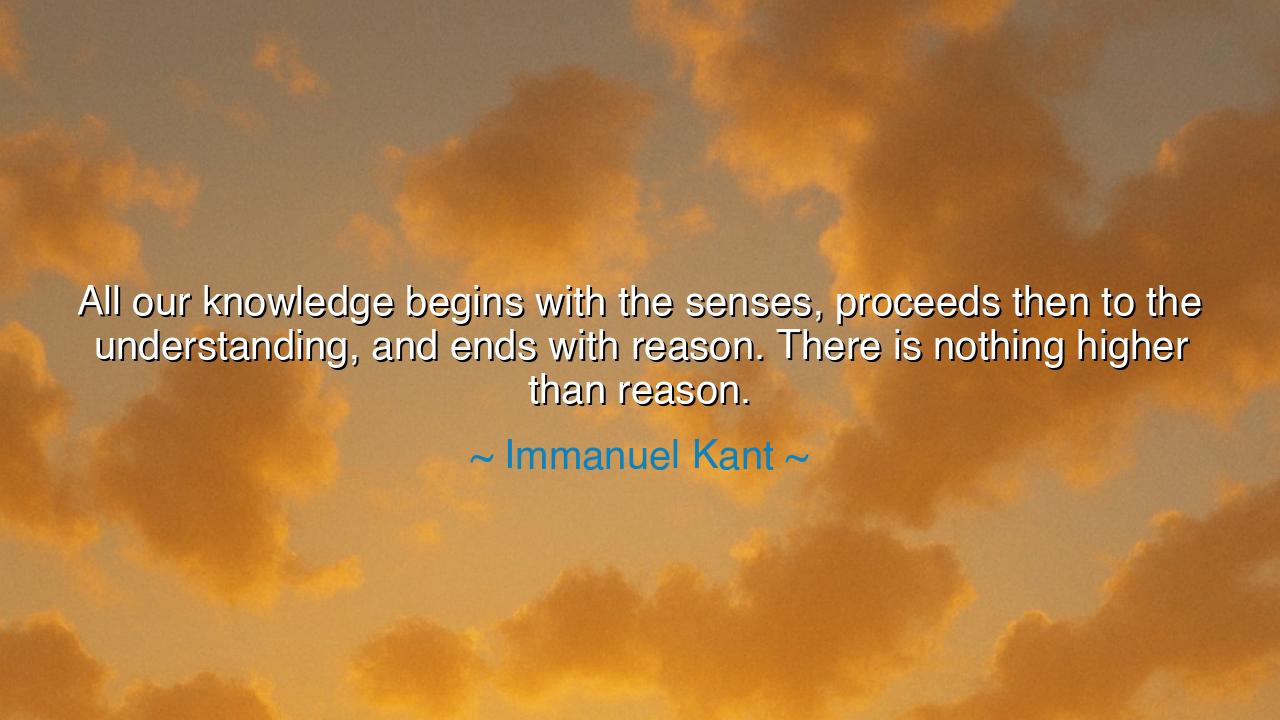
All our knowledge begins with the senses, proceeds then to the
All our knowledge begins with the senses, proceeds then to the understanding, and ends with reason. There is nothing higher than reason.






Hear the words of Immanuel Kant, the great philosopher of Königsberg, who declared: “All our knowledge begins with the senses, proceeds then to the understanding, and ends with reason. There is nothing higher than reason.” In these words lies a ladder of human awakening, a path that every soul must climb if it seeks wisdom. The senses are the gates through which the world first enters us. The understanding is the chamber where these impressions are shaped into order. And reason—that final height—is the crown, the light by which we judge, discern, and grasp the eternal laws of truth.
The ancients too spoke of this ascent. Aristotle taught that nothing is in the mind that was not first in the senses, that we must see, hear, and touch before thought can awaken. Yet Kant carried the teaching further: that these impressions are not enough. A child may hear a thousand sounds, but without understanding, they are noise. And even understanding is incomplete, for without reason, the mind remains a tool without direction. Reason is the charioteer, guiding the horses of sense and thought toward the summit of wisdom.
Consider the life of Galileo Galilei. His senses saw the stars through the telescope. His understanding ordered the movements of Jupiter’s moons. But it was reason that carried him higher—that judged what these observations meant, that challenged the false certainty of tradition, and that declared the earth was not the center of creation. It was reason that lifted him beyond mere sight into truth. And though he was condemned, his reasoning endured, reshaping the world. Here we see Kant’s words alive: sight begins the journey, thought orders it, but reason crowns it.
Yet Kant’s declaration is not only about discovery, but about the dignity of humanity itself. Beasts share the senses, and even some degree of understanding. A wolf can track, a bird can remember, an ape can learn. But what sets man apart is reason—the power to ask, “Why?” The power to imagine justice, to discern morality, to seek not only what is, but what ought to be. In saying “there is nothing higher than reason,” Kant reminds us that this is the flame of the divine within us, the gift that elevates us beyond instinct into moral beings.
But let us not mistake reason for coldness. For true reason is not the denial of wonder, but the deepening of it. To see a star and marvel is the gift of the senses. To understand its distance and motion is the gift of understanding. But to reason upon it, to ask what it tells us of creation, of our place in the cosmos, of the laws that bind us all—that is the highest act of the human spirit. Reason does not extinguish awe; it transforms awe into wisdom.
The meaning, then, is clear: knowledge is a journey upward. Begin with the senses, but do not end there. Order your thoughts with understanding, but do not grow complacent. Strive always toward reason, for it alone gives knowledge its fullest power. To stop short is to live as half a being, but to ascend is to fulfill the destiny of the human mind.
The lesson is this: sharpen your senses, train your understanding, but above all cultivate reason. Do not be content with appearances; ask what lies beneath. Do not stop at information; seek wisdom. In daily life, question motives, weigh choices, and let your actions be guided not by impulse, but by the calm strength of reason. For in every age, passions rage, crowds shout, and senses deceive. Only reason stands firm, a light that does not flicker.
Therefore, let your practice be thus: observe the world carefully, reflect upon it deeply, and judge it wisely with reason. Let reason guide your speech, your choices, your destiny. For as Kant has declared, there is nothing higher than reason—and to live by it is to live as a true human being, upright and free.






AAdministratorAdministrator
Welcome, honored guests. Please leave a comment, we will respond soon